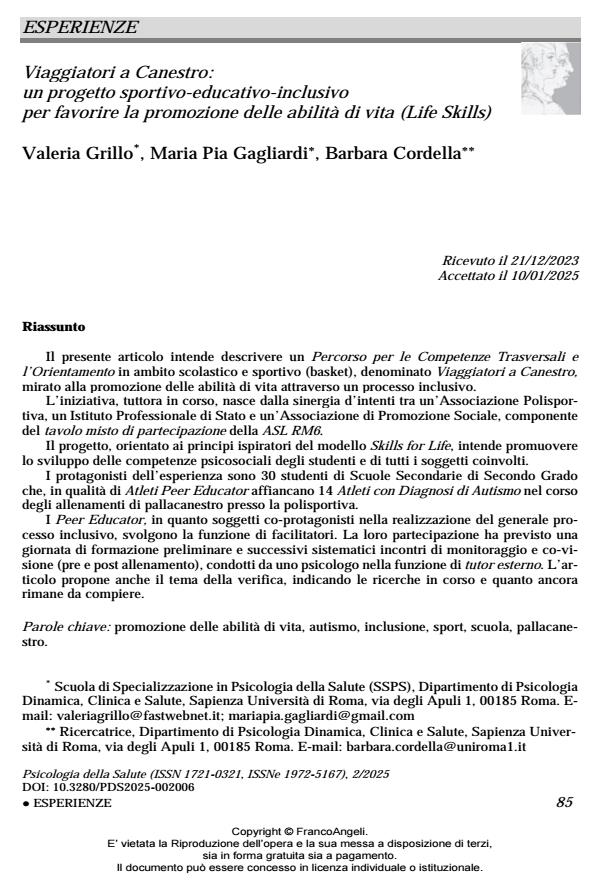Viaggiatori a Canestro: an inclusive sporting-educational project to encourage the promotion of Life Skills
Journal title PSICOLOGIA DELLA SALUTE
Author/s Valeria Grillo, Maria Pia Gagliardi, Barbara Cordella
Publishing Year 2025 Issue 2025/2
Language Italian Pages 16 P. 85-100 File size 251 KB
DOI 10.3280/PDS2025-002006
DOI is like a bar code for intellectual property: to have more infomation
click here
Below, you can see the article first page
If you want to buy this article in PDF format, you can do it, following the instructions to buy download credits

FrancoAngeli is member of Publishers International Linking Association, Inc (PILA), a not-for-profit association which run the CrossRef service enabling links to and from online scholarly content.
This article intends to describe a path for Transversal Skills and Orientation in school and sports (basketball), named Viaggiatori a Canestro, aimed at promoting life skills in able-bodied athletes in interaction with athletes diagnosed with autism. The initiative, still ongoing, was born from the synergy of intent between a Multi-Sports Association, a State Professional Institute and a Social Promotion Association member of the mixed participation table of the ASL RM6. The project, oriented towards the inspiring principles of the Skills for Life model, intends to promote the development of the psychosocial skills of the students and all those involved. The protagonists of the experience are 30 secondary school students who, as Athletes Peer Educators, support the effort of 14 athletes diagnosed with autism during basketball training at the sports center. The Peer Educators, as co-protagonists in the implementation of the general inclusive process, perform the function of facilitators. Their participation included a day of preliminary training and subsequent systematic monitoring and meeting co-vision (pre and post training), conducted by a psychologist acting as external tutor. The article also proposes the theme of checks, indicating the research in progress and how much still remains to be done.
Keywords: life skills promotion, inclusion, autism, sport, school, basket.
Valeria Grillo, Maria Pia Gagliardi, Barbara Cordella, Viaggiatori a Canestro: un progetto sportivo-educativo-inclusivo per favorire la promozione delle abilità di vita (Life Skills) in "PSICOLOGIA DELLA SALUTE" 2/2025, pp 85-100, DOI: 10.3280/PDS2025-002006